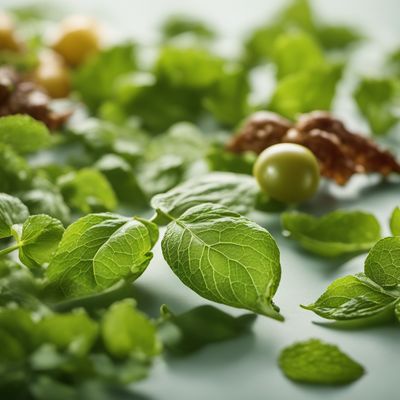
Ingredient
Lemon verbena infusion leaves
The Zesty Elixir: Unveiling the Magic of Lemon Verbena Infusion Leaves
Lemon verbena infusion leaves are delicate, elongated leaves with a vibrant green color. They possess a strong lemony scent that intensifies when crushed or steeped in hot water. The leaves have a smooth texture and release a refreshing, tangy flavor reminiscent of lemon zest, with subtle floral undertones. They are often used to infuse beverages, desserts, and savory dishes, adding a bright and invigorating element to the overall flavor profile.
Origins and history
Native to South America, lemon verbena has a rich history dating back centuries. It was introduced to Europe in the 17th century and quickly gained popularity for its aromatic and medicinal properties. In traditional medicine, lemon verbena was used to alleviate digestive issues and promote relaxation. Today, it is cultivated in various regions around the world, including Europe, North America, and North Africa.
Nutritional information
Lemon verbena infusion leaves are low in calories and are a good source of antioxidants, vitamins A and C, and minerals such as calcium and iron.
Allergens
There are no known allergens associated with lemon verbena infusion leaves.
How to select
When selecting lemon verbena infusion leaves, look for fresh, vibrant green leaves that are free from browning or wilting. Choose leaves that have a strong lemon scent when gently crushed between your fingers.
Storage recommendations
To maintain the freshness of lemon verbena infusion leaves, wrap them in a damp paper towel and store them in a plastic bag in the refrigerator. They can also be dried and stored in an airtight container for future use.
How to produce
Lemon verbena can be grown in a sunny location with well-drained soil. It can be propagated from cuttings or purchased as a young plant from a nursery. Regular pruning will help promote bushier growth and ensure a steady supply of leaves for infusion.
Preparation tips
To make a lemon verbena infusion, steep a handful of leaves in hot water for 5-7 minutes. The resulting infusion can be enjoyed as a refreshing tea or used as a base for cocktails, sorbets, or sauces. Lemon verbena leaves can also be finely chopped and added to salads, marinades, or baked goods for a burst of citrus flavor.
Substitutions
If lemon verbena infusion leaves are not available, you can substitute with lemon zest or lemon balm leaves to achieve a similar citrusy flavor.
Culinary uses
Lemon verbena infusion leaves are commonly used to make herbal teas, flavored syrups, and infused oils. They can also be incorporated into desserts such as custards, ice creams, and cakes. In savory dishes, lemon verbena leaves pair well with fish, poultry, and summer vegetables.
Availability
Lemon verbena infusion leaves are commonly available in regions where the herb is cultivated, including Europe, North America, and North Africa.
More ingredients from this category » Browse all

Clary sage infusion leaves
The Aromatic Herb for Culinary and Medicinal Delights

Common speedwell infusion leaves
The Healing Power of Common Speedwell

Rock rose infusion leaves
The Fragrant Elixir: Exploring the World of Rock Rose Infusion Leaves

Muña infusion leaves
Andean Mint Delight

Mallow infusion leaves
The Soothing Herb: Mallow Infusion Leaves

Toadflax infusion leaves
The Herbal Elixir of Toadflax

Birch infusion leaves
The Healing Elixir: Birch Infusion Leaves

Fumitory infusion leaves
The Herbal Elixir: Unveiling Fumitory Infusion Leaves

Silverweed infusion leaves
The Healing Power of Silverweed

Plantain infusion leaves
The Versatile Herb

Eucalyptus infusion leaves
Refreshing Eucalyptus: Aromatic Leaves for Infusions

Wild strawberry infusion leaves
The Delicate Essence of Wild Strawberry Infusion Leaves